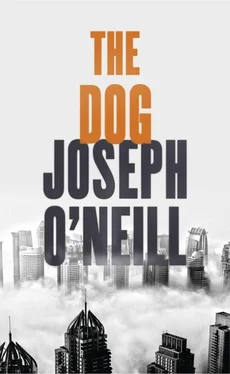Let me add: I’m not blind to the jobsite labourers, South Asian men who are most conspicuous in the earlier stages of site-work and in whom, from the high-up and distant vantage point from which I inevitably observe them, one might take an almost entomological interest as they crisscross and here and there swarm, seemingly one and the same in their colour-coded corporate uniforms. I emphasize the qualifiers ‘almost’ and ‘seemingly’. I’m aware that I’m looking at individual persons. I have taken steps to inform myself about the oppressive and predicamental working conditions, not to say near-enslavement, to which many of them are subject from day one. (Or even before day one: many are instructed, so I’ve heard, to don the abovementioned corporate attire in their country of origin so that they travel to and arrive in Dubai already colour-coded.) I also know enough to not give weight to the emotion of solidarity by which I experience, from inside my chilled apartment, a one-sided connection to these men, who are in the blazing hot outdoors. I’ll simply say this: I have run the numbers, and I’m satisfied that I have given the situation of the foreign labour corps, and my relation to it, an appropriate measure of consideration and action.
(I don’t want to dwell on this or pat myself on the back (if back-patting is what’s called for, which I’m not saying it is). I will only, quickly, say:
1.
The subjection of persons to unjust, harsh and otherwise wrongful treatment constitutes mistreatment of persons.
2.
Labourers in Dubai are mistreated.
3.
The problem of mistreatment is widespread.
3.1
Mistreatment is not confined to labourers in Dubai.
4.
The concept of personhood is a valid basis for an ethics.
5.
The personhood of all persons is equal.
5.1
Locality of a person is an invalid basis for preferring the personhood of one person to that of another.
5.2
A corollary of personhood is the freedom from mistreatment.
5.3
A corollary of an ethics of personhood is a practicable duty to promote all freedoms that are corollaries of personhood.
5.3.1
A practicable duty is a duty to take action that is reasonably practicable.
5.3.1.1
What is reasonably practicable depends on the facts of the case.
5.4
I ought to take practicable action to stop or reduce the mistreatment of persons.
5.4.1
In doing as I ought pursuant to 5.4, I ought not to act for the benefit of labourers in Dubai in preference to acting for the benefit of persons located elsewhere on the basis of my and the labourers’ coincidental locality in Dubai.
5.4.1.1
I cannot establish a basis alternative to the basis referred to at 5.4.1 for acting preferentially as aforesaid for the benefit of labourers in Dubai.
6.
There exist organizations that take action to prevent, halt or reduce the mistreatment of persons (‘organizations’).
6.1
An organization may be effective.
6.2
It is practicable for me to identify effective organizations.
6.3
The effectiveness of an organization relates to the continuing receipt by the organization of donations from the public.
7.
It is impracticable for me to directly prevent, stop or reduce the mistreatment of persons.
8.
It is practicable for me to donate to effective organizations.
9.
A donation by me to effective organizations will have the effect of promoting the freedom of persons from mistreatment.
10.
A donation by me to effective organizations is a doing of my duty as described at 5.4 if the donation is commensurate with what it is practicable for me to donate.
(Or something to that effect. I’m sure this reasoning is full of holes. If I were to show it to professionals, they would fall around laughing. Let them. I’m not trying to move the world-historical philosophical needle here. I’m trying to figure out how to do the right thing, and last I heard that wasn’t something you needed a Ph.D. to do.)
Human Rights First (HRF) and Human Rights Watch (HRW) are nonprofit, nonpartisan, independent and reputable international advocacy and action organizations with global reaches. They are effective organizations. In my first year in Dubai, after I had had the chance to consider matters, I set up and activated automatic bank transfers of 18.5 per cent of my gross monthly salary to HRF and 18.5 per cent to HRW. (These are US-tax-deductible charitable contributions, of course, but that’s between me and the IRS, and by the by. (I arrive at the 37 per cent number by calculating the maximum donation that’s consistent with my making reasonable and prudent provision for my long-term comfort and solvency. A monthly cash-in-hand of six thousand USD, net of taxes and mortgage payments, strikes me as reasonable and prudent for these purposes. (Note: the Autobiography is a corporate car, owned and paid for by Batros Family Office (Dubai) Ltd.))) I cheated a little by asking HRW to allocate my donations to the struggle for migrant workers’ rights in the Gulf states, but only if in HRW’s judgment this would be appropriate. HRW confirmed this was appropriate, thanked me, and did as I asked. I admit that I’m uneasy about maybe not doing the right or valid thing with this allocation, the self-serving purpose of which is to make it easier for me to walk around Dubai without feeling too guilty. I can live with that uneasiness, which is not as bad as the alternative uneasiness. While far from saying that one can purchase rectitude or that I’ve now got some kind of get-out-of-jail card, I do feel I’m acquitting myself well enough so as not to have to lower my eyes to the ground when I meet someone.
(One last point: because I accept as a given that Dubai labourers are very badly treated, I don’t owe it to the labourers to take steps to find out about exactly what kind of mistreatment they suffer from. Knowing those details would make no actionable difference to me. By contrast, HRW and HRF must go into the details, since that is their job, and what they find out is knowledge that can be imputed to me, that is, whatever they know, I know, even if I don’t actually know what they know. It sounds counterintuitive, until one bears in mind the concept of outsourcing.))
On the afternoon of the Ted Wilson mission, I drew little relief from looking out the window. From the Pasha, I could see the Astrominium site (as it then was). All work on that mighty tower-to-be had just stopped. The sight of the huge abandoned pit was demoralizing. When the Full Body Shiatsu came to an end, I did not move. I lay limp in the Zero Gravity position, dreading the empty and shameful hours and days and weeks and years ahead. Normally I’m tolerant of my lot, but sometimes I am gloomy and cannot bear it and I question the rationality and desirability of sticking around in person for a further (all things being equal) three or four decades, and I find it calming that I have no dependants of any kind and am always at liberty to hang myself. The gloom passes, and gives way to the more searching notion that one’s conduct is, by definition, a leading of the way, and we are all conductors, and not even the man without dependants is an island, and one’s body is not one’s own. It follows that to put oneself to death would offer a dispiriting example and one ought to not do it; one ought to biologically persist. Even though it thankfully remains the case that almost no one in Dubai — or elsewhere, at this point, I believe — really gives a shit what I do, I am still bound to try to do as little damage as I reasonably can. This mainly involves lying low. From the moment I arrived in this country, I have deliberately tried to be by myself inside my apartment as often and for as long as is consistent with not turning into an oddball.
Читать дальше
Конец ознакомительного отрывка
Купить книгу












